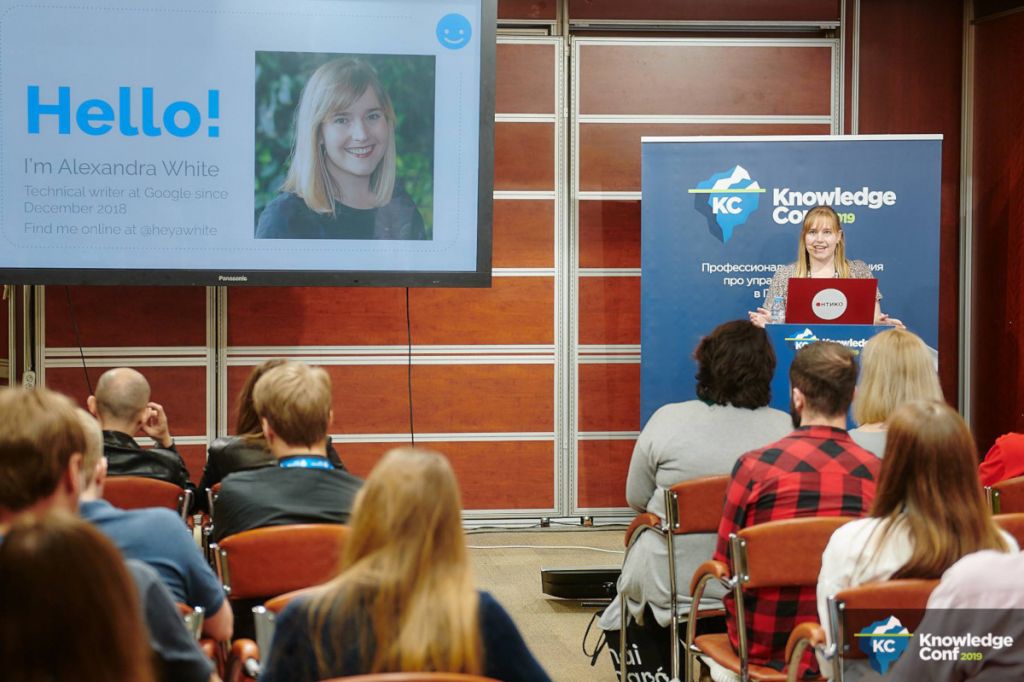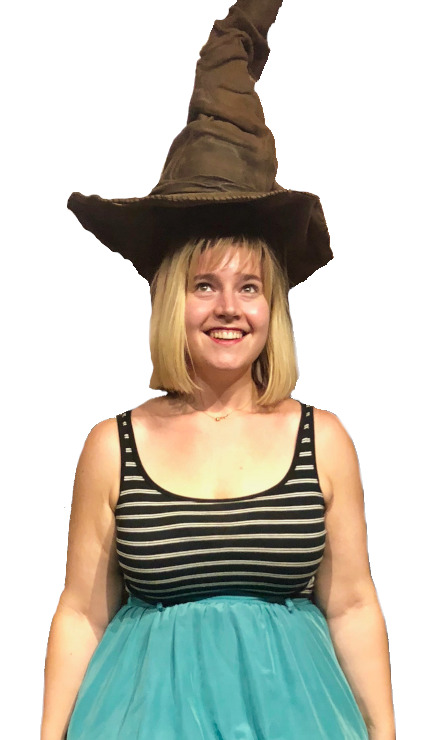May 06, 2019 Speaking
KnowledgeConf 2019 Takeaways
I was honored to be invited to speak at KnowledgeConf 2019 in Moscow in April (English marketing site and actual Russian conference site). I was the only English presenter among fantastic Russian talks, and I look forward to being able to watch them with translated captions!
My talk, “Creating compelling multimedia documentation,” covered the importance of considering the different methods of creating documentation, particularly video. While I did not specifically walk through how to make a video, I did cover when and when not to make video, considerations for script and storyboard creation, branding, and usability.

Remembering to tell a story
In the day before the talk, I performed a dry run for some of the conference managers and received feedback that fundamentally changed the way I was thinking about distributing knowledge. That said, the advice I was given mimicked advice I gave in my talk: tell a story.

I was so busy trying to tell people the conclusions I came to, lesson I’d learned while creating video content, that I didn’t tell the story of how I got to those conclusions. A list of answers doesn’t make a good talk.
Engaging your audience with the how is far more compelling and far more likely to lead to lasting impact.
For example, I spoke about when to use webinars a learning tools. I listed reasons to consider webinars, including exploring multiple possible outcomes to a task. Instead of just listing that as a time to consider webinars, I spoke about an example product: Pottermore. Early on in Pottermore, you are sorted into a Hogwarts house. These results can change dependent on your answers, and should you want to teach people about the house sorting process, you may want to show what happens on your adventures if you answer questions differently. A webinar is the right way to explore this process.
Without this example and little memorable Harry Potter story, the idea of “multiple outcomes” from an activity didn’t make sense. And while it’s ultimately not the most personal example I gave, it was certainly the one that led to the most visual joy.
Speech pace in foreign countries
While at Write The Docs Prague, conference speaker Rowan Cota used a teleprompter app to ensure she spoke at a speed that wasn’t too fast for an audience of people whose first language was not English. I spent a lot of time practicing with a teleprompter app and practicing for non-native speakers.
I ended up able to use my speaker notes and making a few last minute changes, leading me to abandon my teleprompter app. But, all of that measured practices proved itself to have made a huge difference. No matter how nervous I was, I didn’t speed up.
That said, I cannot recommend using teleprompter apps enough. I did not even realize how fast my previous talks had gone until I started paying attention to my word-per-minute.
Conference conversation culture
I feel so fortunate that people not only showed up to hear me speak, but they also asked compelling and engaging questions that gave me a chance to better understand their needs and how I could help.
And unlike American conferences I’ve been to, the conference conversation culture in Russia is very centered around what people have learned in their talks. There isn’t the same expectation of networking and small talk, rather it’s an opportunity to exchange new ideas. While much of this conversation happened in Russian (remember: only non-Russian speaker present), I had several conversations with fellow speakers and attendees around the importance of documentation. We discussed how their companies made decisions in the realm of education curriculum.
My goal for speaking at any conference is that one person walks away having learned something that they can take back and implement in their job. I believe I was able to do just that.
The future of this talk
In June, I’ll be leading a workshop on the same topic at Evolution of TC. Hopefully the feedback I received will help make that session more rewarding for those attendees.
One last thing: if you can, go to Moscow
I heard from multiple people involved in organizing this conference and others that it’s difficult to attract foreign speakers, particularly those from the United States. I get it. Honestly, I was nervous about going to Russia for a variety of reasons. I’m here to say that not only was it worth it, but I hope to be able to go back again multiple times before my visa expires in 2022.
There were some technical details I had to manage before going that seemed quite intimidating. But the visa process ended up being far easier than I expected and the KnowledgeConf team helped me every step of the way.
Moscow is a beautiful city. The public transportation runs smoother than it does in New York City (a shock to no one who lives here). With the help of Google Translate, a print out of the Cyrillic alphabet, and learning a few words (particularly, “thank you”), even people who didn’t understand me were generally helpful and friendly.
If you have an opportunity to apply in 2020 to KnowledgeConf or another Ontico managed conference, I strongly encourage you to do so.